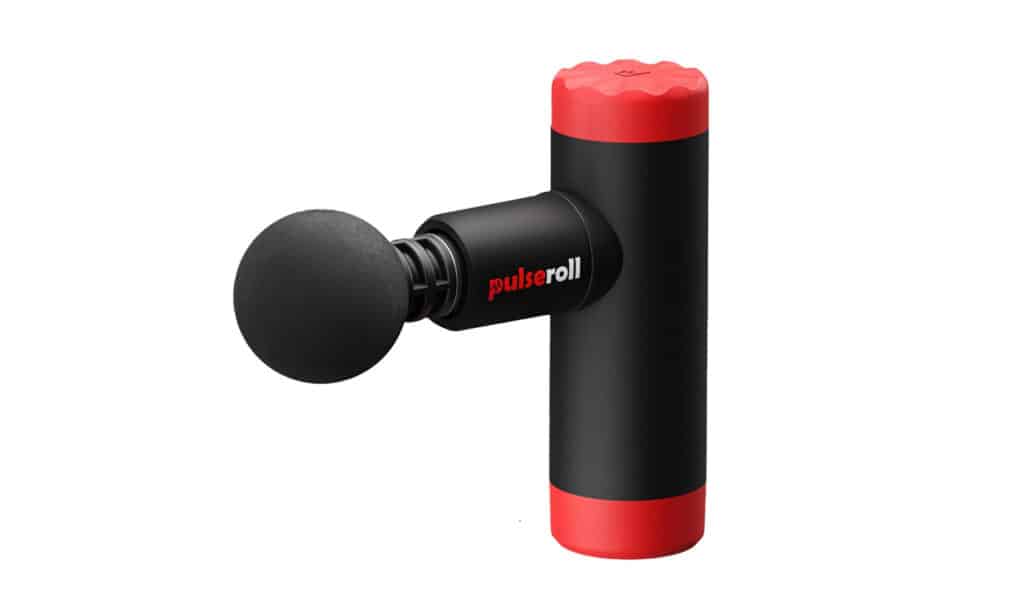
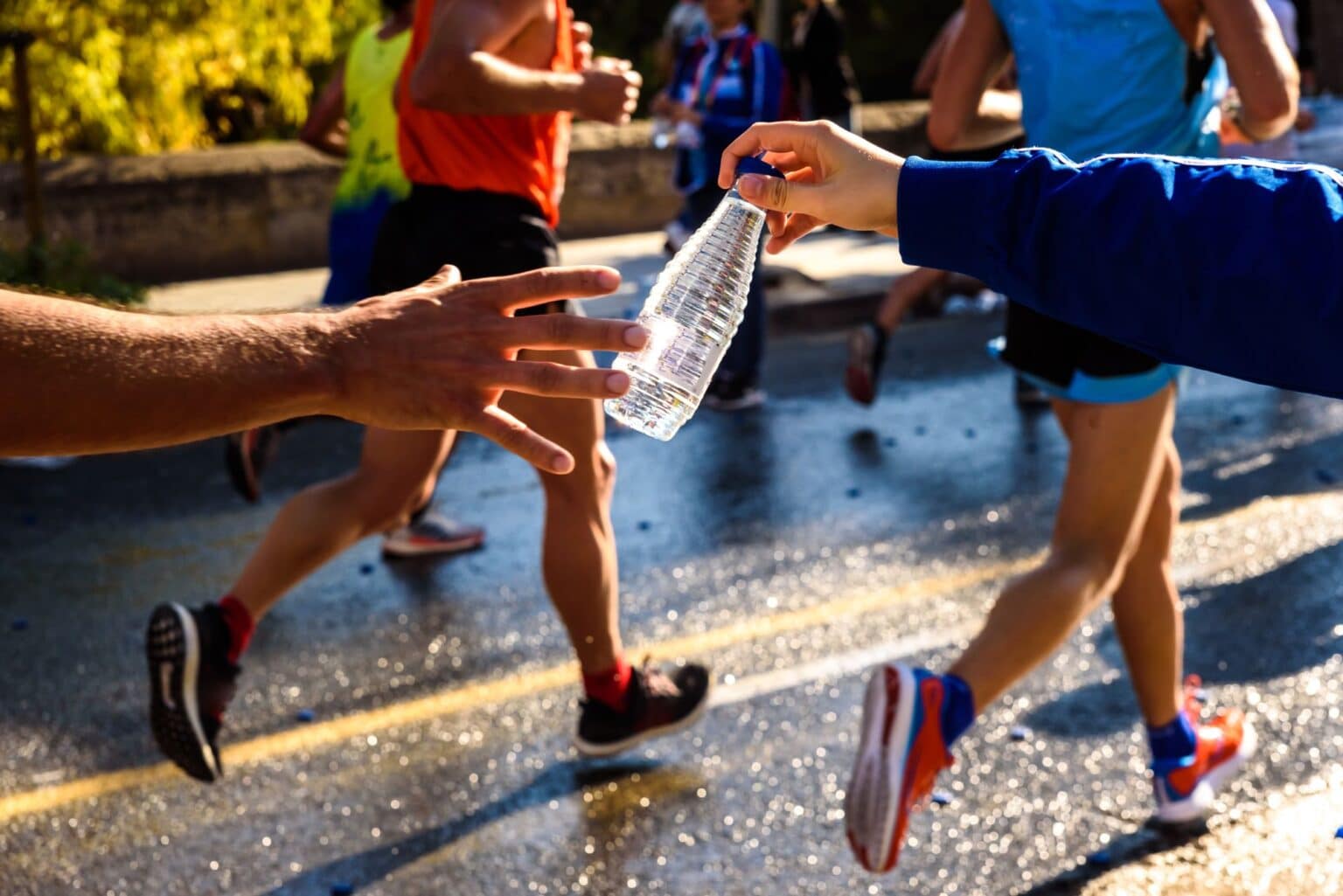
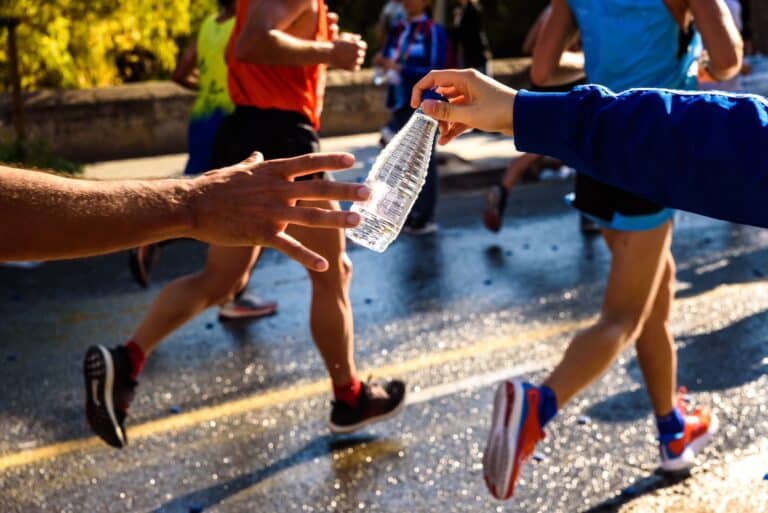
As a long-distance runner, it is important to stay hydrated before, during, and after a marathon. Water plays a crucial role in regulating body temperature, maintaining blood volume and electrolyte balance, and delivering oxygen to working muscles. Not drinking enough water can lead to dehydration, which can place significant strain on the cardiovascular system, leading to decreased performance and increased fatigue. Dehydration can also cause muscle cramps, dizziness, and even heatstroke. Find out how much water to drink during a marathon here:
The amount of water you need to drink during a marathon depends on various factors, including your body size, sweat rate, and the weather conditions. It’s essential to listen to your body and hydrate when you feel thirsty.
Understanding how much fluid you need is crucial, as hydration requirements can vary significantly from person to person. Factors like body weight loss during exercise, sweat rate, and environmental conditions all play a role. Proper hydration should begin several days before the marathon, focusing on maintaining consistent fluid intake to prepare your body.
Electrolytes or salt tablets are equally important, as they support fluid retention and muscle function during intense physical activity. Maintaining the right balance of fluids and electrolytes is critical for optimal performance and endurance during a marathon.
Sweat rate refers to the volume of sweat produced during a workout, which is critical for determining hydration needs. To determine your personal fluid needs, you can measure your sweat rate. This is the amount of water lost through sweating during a specific period of time, usually an hour. To calculate your sweat rate, follow these steps:
For example, if you lose 2 pounds (32 ounces) during a one-hour run and drink 8 ounces of water, your sweat rate would be 32 + 8 = 40 ounces per hour
Understanding your sweat rate allows for more effective hydration strategies during a marathon, reducing the risk of dehydration. Knowing your sweat rate helps you determine how much to consume fluids during a marathon to replace lost fluids and maintain optimal performance.
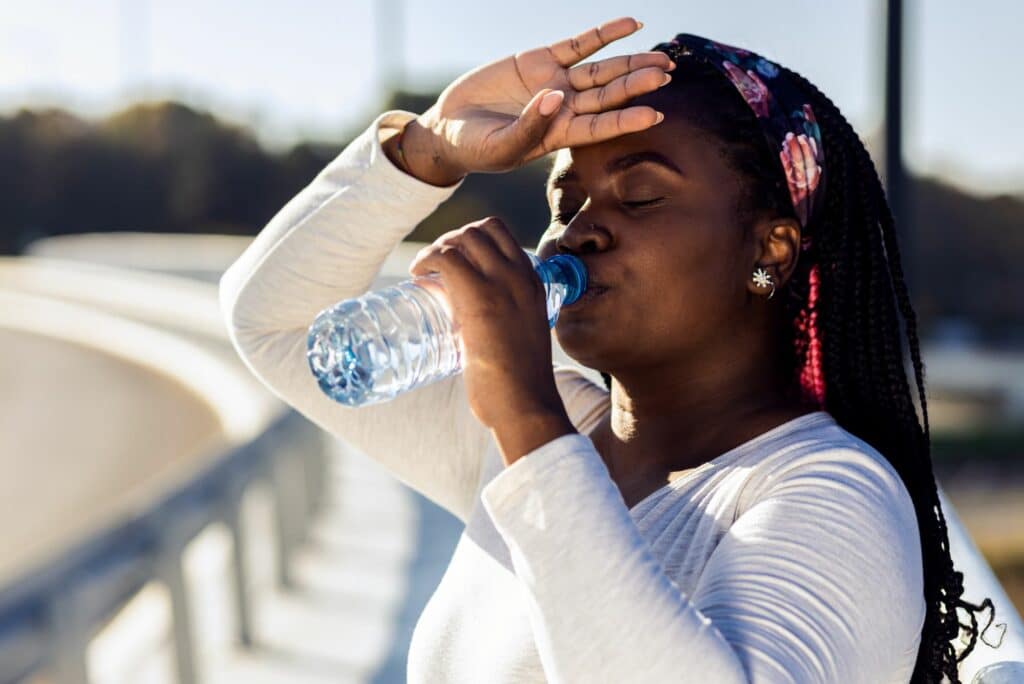
Several factors can affect your fluid requirements during a marathon. These include:
It’s crucial to take these factors into account when determining how much water to drink during a marathon.
Maintaining proper fluid intake is crucial for keeping your body weight stable and ensuring overall health during intense exercise like a marathon. According to the American College of Sports Medicine, athletes should drink 17-20 ounces (roughly 0.5 to 0.6 litres) of fluid 2-3 hours before exercise to top off body fluids. During the marathon, aim to drink 7-10 ounces (0.20 to 0.30 litres) of fluid every 10-15 minutes to replace lost body fluids effectively.
It’s essential to remember that individual fluid needs can vary based on factors like exercise intensity, environmental conditions, and personal sweat rate. Conducting a sweat test can help you determine your unique sweat rate and adjust your fluid intake accordingly. To perform a sweat test, weigh yourself before and after exercise, and calculate the amount of fluid lost through sweat. This personalised approach ensures you stay adequately hydrated and perform at your best.
The general guideline for staying hydrated during a marathon is to drink 6-10 ounces of fluid per hour in normal conditions. However, it’s crucial to listen to your body and adapt your hydration strategy as needed. Athletes should start drinking early and at regular intervals during the marathon to replace water lost through sweating.
Make use of aid stations along the course by grabbing water or a sports drink at each stop. Keep in mind that overhydration can be just as dangerous as dehydration. Drinking excessive amounts of water can lead to hyponatremia, a condition where sodium levels in the blood drop to dangerously low levels due to excessive fluid intake.
Several factors influence hydration needs during a marathon, including body weight, sweat rate, exercise intensity, temperature, and humidity. When planning your hydration strategy, consider not just your water consumption but also your intake of gels and electrolytes. On average, runners lose between 400 and 2,400 ml of fluid per hour, with the typical loss being around 1,200 ml.
By understanding your body’s unique needs and following these guidelines, you can optimise your hydration strategy and perform your best on race day.
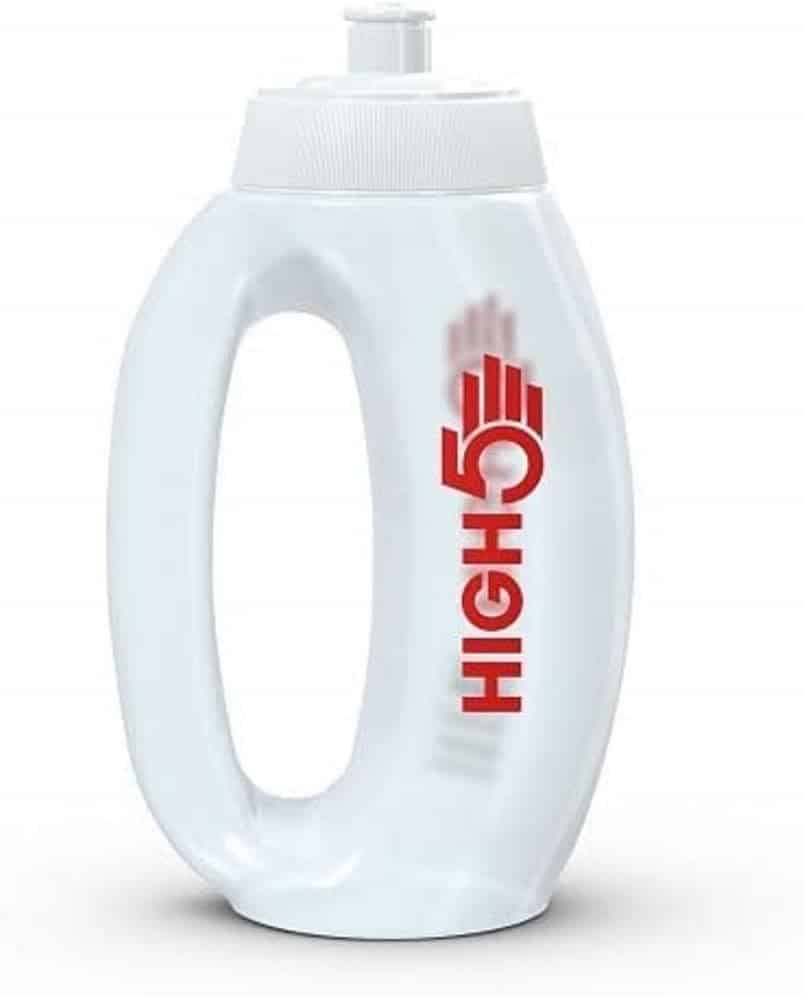
Most marathon training guides recommend consuming 400-800ml of fluids per hour, depending on sweat loss and race conditions, to stay properly hydrated. Since sweat loss during exercise can vary widely – from 400ml to as much as 2,400ml per hour – factors like age, sex, and running intensity should guide your hydration strategy. Adequate fluid intake helps regulate body temperature, especially during long runs, to maintain performance and prevent fatigue. For optimal absorption, larger individuals can typically handle around 750ml to 1 litre per hour.
To maintain hydration effectively, it’s better to take small, frequent sips of water rather than consuming large amounts all at once. Using a water bottle with a sports cap or a water pack can make it easier to stay hydrated while running. We recommend the Decathlon Blue 10L Unisex Trail Running Bag – this functional water pack has a total capacity of 2 litres, featuring a 1-litre reservoir in the back and two 500ml bottles conveniently placed in the front.
You may also want to explore our blog, Best Hydration Packs for Runners in the Summer, for more expert recommendations.
By tailoring your fluid intake to your body’s needs and drinking regularly throughout the run, you can ensure peak performance and safety on race day.
In addition to the amount of fluid consumed, timing is also crucial for optimal hydration during a marathon. It’s best to start hydrating early on in the race and maintain regular water intake throughout. Familiarising yourself with the marathon course can help you plan your hydration strategy effectively, noting where water stations are located and any challenging sections that may require extra hydration.
Aim to drink 4-8 ounces of fluids every 15 to 20 minutes. You can adjust this based on your sweat rate and how you feel during the race. Using smaller, portable water bottles or a hydration pack allows runners to hydrate frequently without depending solely on water stations.
Start hydrating during training runs to get a sense of your body’s needs and develop a hydration strategy that works best for you. Remember, it’s always better to err on the side of caution and drink more rather than risk dehydration.
Developing a well-thought-out hydration plan is essential for staying hydrated during a marathon. Your plan should consider your individual fluid needs, exercise intensity, and environmental conditions. Instead of consuming large amounts of fluid at once, aim to drink fluids regularly throughout the day.
The Gatorade Sports Science Institute recommends drinking 17-20 ounces of fluid 2-3 hours before exercise, followed by 7-10 ounces every 10-15 minutes during the marathon. Monitoring your urine output and colour can also help you gauge your hydration status. Dark yellow or amber-coloured urine may indicate dehydration, while pale yellow or clear urine suggests proper hydration.
Using a hydration log to track your fluid intake can be incredibly helpful. This log allows you to identify patterns and make necessary adjustments to your hydration plan. Remember, hydration planning is not a one-size-fits-all approach. Individual needs can vary, so it’s crucial to work with a sports dietitian or healthcare professional to develop a personalised hydration plan that meets your unique requirements.
By following these guidelines and tailoring your hydration strategy to your specific needs, you can ensure optimal performance and safety during your marathon.
As mentioned earlier, maintaining the right balance of fluids and electrolytes is critical for optimal performance during a marathon. Electrolytes are essential minerals like sodium, chloride, potassium, and magnesium that help regulate fluid levels in your body.
Electrolyte imbalances can cause muscle cramps and hinder athletic performance. Sodium plays a vital role in maintaining proper hydration levels as it helps the body retain fluids and supports nerve and muscle function. Consuming sports drinks or energy gels that contain electrolytes can help replenish lost electrolytes during long runs.
However, it’s important to note that excessive consumption of electrolyte-rich drinks or gels can also lead to an imbalance, so be sure to follow the recommended intake guidelines and listen to your body.
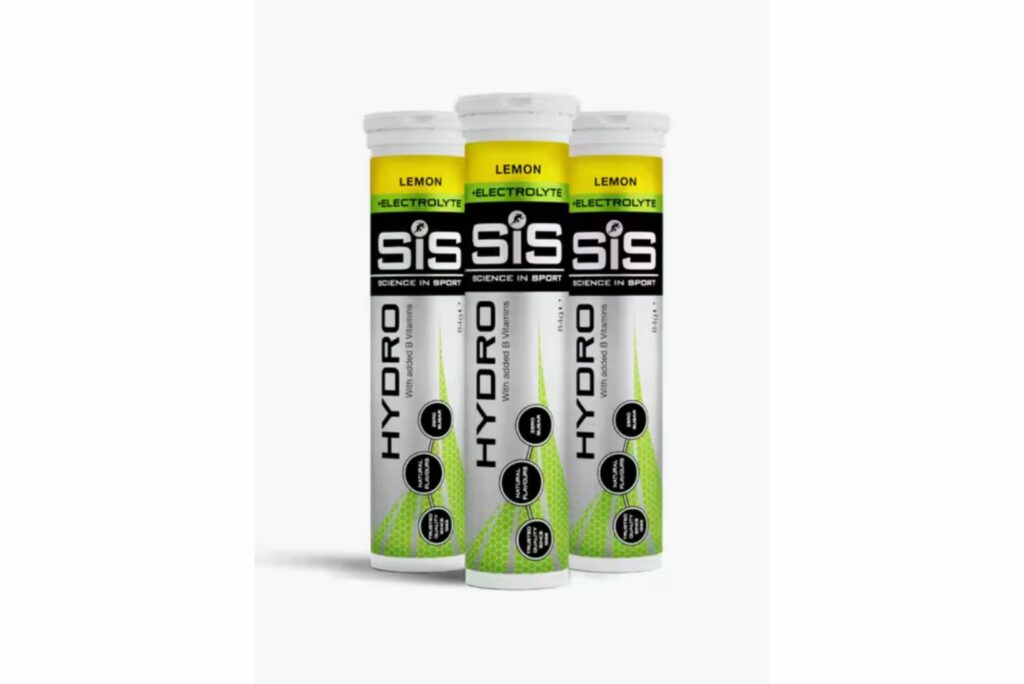
Electrolytes are essential for proper hydration and muscle function, especially during endurance activities like marathons. They help regulate fluid balance in the body and support nerve and muscle function.
Sodium is particularly important as it helps retain fluids and prevents dehydration. However, excessive sweating can cause sodium loss, leading to an electrolyte imbalance that can hinder performance.
To maintain proper electrolyte balance, it’s important to replenish lost electrolytes through hydrating with sports drinks or consuming energy gels that contain electrolytes during a marathon.
Remember to always listen to your body and make adjustments to your hydration strategy as needed. With the right approach, you can stay hydrated and perform at your best during your next marathon.
Electrolytes are essential for maintaining fluid balance and supporting muscle function during a marathon. Here are three effective ways to replenish them:
Choose the option that best fits your needs to stay hydrated, energised, and ready to tackle the miles ahead!
You might also be interested in reading our blog, Using Salt Tablets During a Run, for valuable tips, expert recommendations, and helpful insights.
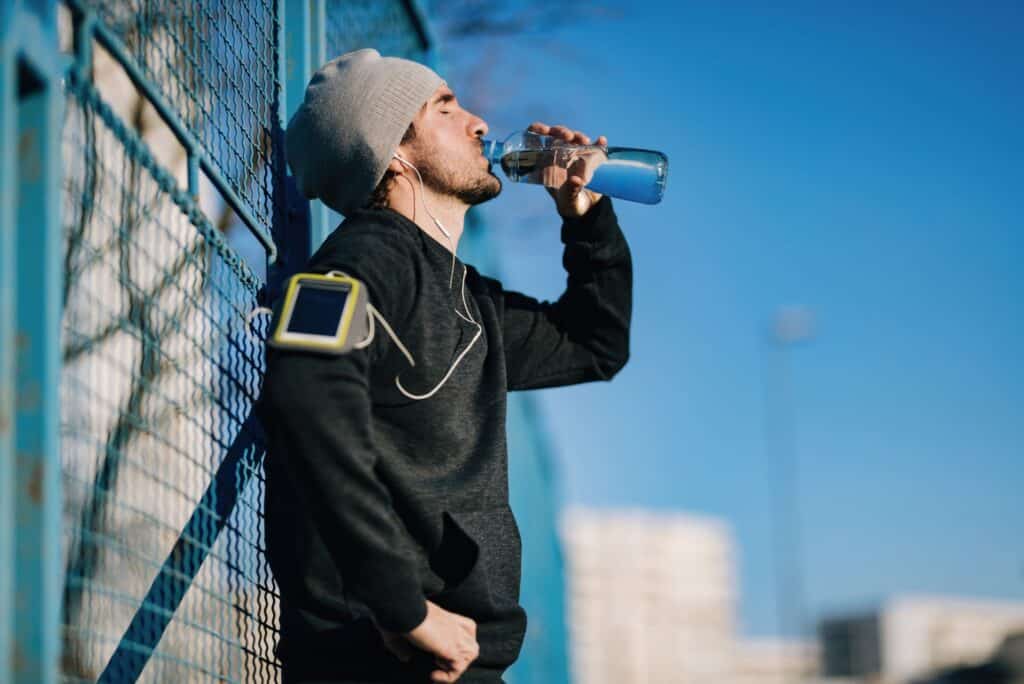
Proper hydration doesn’t just involve what you do during the race but also how you prepare leading up to it. Marathon nutrition, including proper fuelling strategies and hydration needs, is critical to ensure optimal performance. Here are some tips for a strong pre-race hydration strategy:
By following these tips, you’ll be able to start your marathon well-hydrated and ready to tackle the distance ahead. Remember, proper hydration is key to reaching your full potential on race day.
Proper hydration is essential for marathon performance, but your pre-race food and drink choices are equally important. On the morning of the marathon, aim for a breakfast rich in carbohydrates but low in fat and fibre—porridge with banana is an excellent option. Additionally, consider having a small, carbohydrate-rich snack about an hour before the race to fuel your energy levels.
As for drinks, avoid sugary or carbonated beverages and stick with water, sports drinks, or electrolyte-infused water. It’s also important to keep track of your fluid intake leading up to the race so you don’t start too dehydrated.
Rehydration is crucial after crossing the finish line to prevent muscle cramps and fatigue. To support optimal recovery, begin replenishing lost fluids and electrolytes within the first-hour post-race. Aim to restore your pre-race body weight by drinking adequate fluids, ensuring your body quickly recovers from the physical demands of the marathon. Consuming a well-balanced meal with electrolyte-rich foods can also help replenish lost nutrients and support muscle recovery.
Remember, proper hydration doesn’t end when the race is over. Continue to hydrate throughout the day and in the days following to support your body’s recovery process.
Weighing yourself before and after a marathon is a simple yet effective way to measure fluid loss during the run. Each gram of weight lost translates to approximately one millilitre of fluid, providing an accurate gauge of your hydration needs. By tracking these changes, you can better understand your body’s requirements and optimise your hydration strategy for future runs.
To rehydrate effectively after a race, aim to consume about 1.5 times the amount of fluid lost. For every kilogram of body weight lost during the marathon, drink approximately one litre of fluids. Combining water with electrolyte drinks and incorporating water-rich fruits into your recovery routine is a highly effective way to restore hydration levels and replenish essential nutrients.
Dehydration and hyponatremia are two common conditions that can affect marathon runners.
Dehydration often reveals itself through symptoms like dry mouth, fatigue, and dark yellow urine. If left unaddressed, it can lead to reduced urination, muscle cramps, and headaches. Even a minor loss of just 2% of your body weight due to dehydration can negatively impact performance, causing an elevated heart rate and increased risk of cramping. By recognising early warning signs such as fatigue and muscle cramps, you can take action to prevent dehydration from escalating into a more serious issue.
Hyponatremia, caused by low sodium levels in the body, can trigger symptoms like nausea, confusion, headaches, and muscle weakness. These signs are particularly common among runners and can serve as early warnings. Prompt recognition of these symptoms is essential to prevent more serious complications and ensure timely intervention.
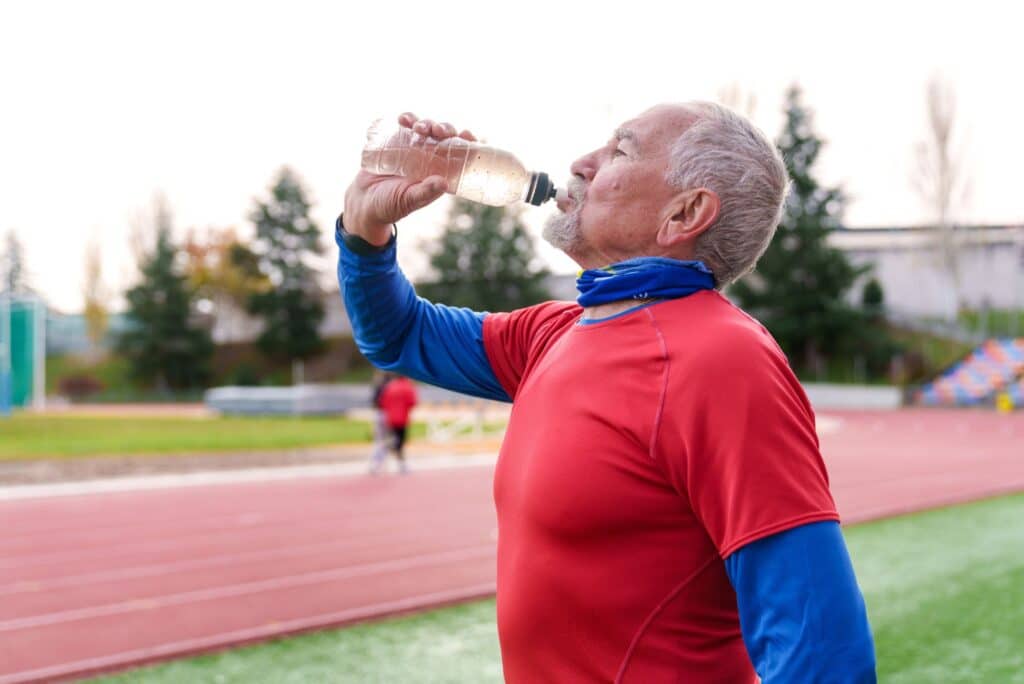
Remember, proper hydration and electrolyte balance are essential for marathon performance.
By following these tips and incorporating them into your training and race day strategies, you can optimise your fluid intake, prevent dehydration and hyponatremia, and reach your full potential as a marathon runner.
So stay hydrated, fuel up correctly, and keep running towards your goals! As the saying goes, “The thirst is real” during a marathon – so make sure to quench it properly!
Join our mailing list to stay up to date with the latest UK running events, training tips, and exclusive offers on running products. Rest assured, we value your privacy and would never dream of selling your address. Sign up now…
Share this article
The marathon is an extremely challenging event that requires a lot of dedication and a...
Designed by our head coach, Mike Gratton, winner of the 1983 London Marathon, this 8-week...
Running a marathon distance is the ultimate goal for many runners. It takes dedication, discipline...
I didn’t get into London Marathon via the ballot. Am I too old to focus...
Hi Mike, this year, I ran two half marathons (1:45 and 1:38) and a full...
For 2026, the London Marathon has changed its Good For Age (GFA) qualifying times, and...
We’re here to make sure you’re up-to-date with the latest running tips, events and product discounts – we’ve always got your back! Rest assured, we value your privacy and would never dream of selling your address.
BONUS: Sign up today and receive a FREE code for our Sub-4-Hour Marathon Plan
Your privacy settings
Manage Consent Preferences
Necessary
Analytics
Embedded Videos
Marketing
Facebook Advanced Matching
Facebook CAPI